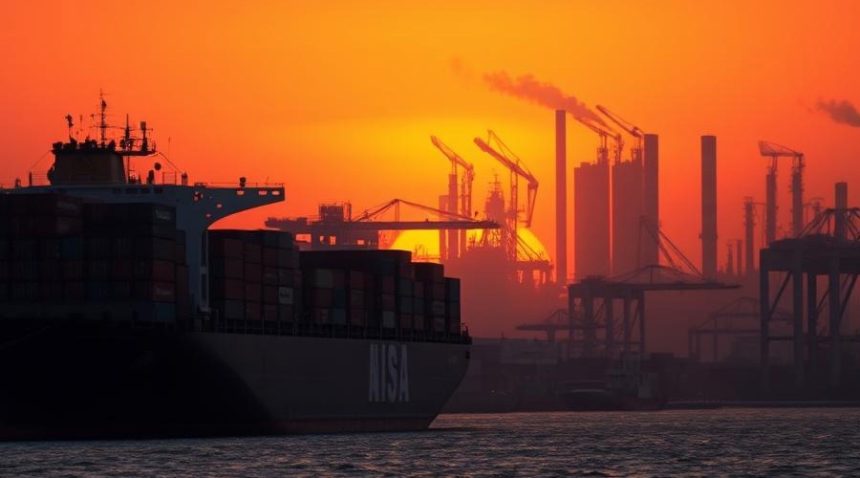Rising oil prices, shipping delays, and route risks—discover what’s at stake
The growing tensions between Israel and Iran are causing serious concern for countries that depend on trade routes through this region. India, which relies heavily on these routes for its trade with Central Asia, could face several challenges if the conflict intensifies.
This article explains how the situation could affect India’s trade, focusing on energy imports, shipping, key projects like the Chabahar port, and overall trade with Central Asian countries.
Disruption in Key Trade Routes
The Strait of Hormuz, a narrow waterway between Iran and Oman, is one of the world’s most important shipping routes. A large portion of the world’s oil and natural gas passes through this strait every day. Any disturbance in this area affects global energy supplies and shipping.
India imports over 60% of its crude oil through the Strait of Hormuz. If this waterway is blocked or affected by military activity, the supply of oil to India could slow down or become more expensive. There is also a risk of higher freight charges and increased marine insurance costs for ships using this route.
Rising Oil Prices and Shipping Costs
Tensions in the region have already caused oil prices to rise. Brent crude oil, which is a key benchmark, has crossed $80 per barrel in recent weeks. Experts warn that if the Strait of Hormuz is closed, oil prices could rise to $100 or even higher.
Higher oil prices would directly increase India’s import bills. Fuel prices in India could rise, pushing up inflation and making life more expensive for everyone. The Indian rupee could also weaken because of the increased cost of buying dollars to pay for oil imports. A weaker rupee makes imports more costly and affects the country’s economy in many ways.
Apart from oil, shipping costs are also rising. Insurance premiums for ships using the region have gone up, and shipping companies are adding risk charges. This means transporting goods is becoming more expensive, and exporters will find it harder to compete in foreign markets.
Impact on Agricultural Exports
Iran is a major buyer of India’s basmati rice. India exported about 1 million tonnes of basmati rice to Iran last year. The ongoing conflict and related disruptions have left thousands of tonnes of rice stuck at ports. Indian exporters are struggling as they wait for payments and clearance of these shipments.
Other agricultural goods such as tea, soybean meal, and fresh fruits that move through Iranian ports could also face delays or cancellations. This would hurt farmers and exporters, especially in regions like Punjab, Haryana, and Maharashtra that depend on this trade.
Challenges for Chabahar Port and Trade Corridors
India has invested in the Chabahar port in Iran to strengthen trade links with Afghanistan and Central Asia. This port allows India to bypass Pakistan and have direct access to these markets.
The conflict has raised concerns about the security and functioning of not just Chabahar but also nearby ports like Bandar Abbas, which is close to the Strait of Hormuz. If these ports face trouble, India’s trade plans through Iran could suffer major delays.
Key transport projects such as the Chabahar-Afghanistan rail link and the International North-South Transport Corridor (INSTC), which connects India to Russia via Iran and Azerbaijan, may also get disrupted. This would slow down India’s efforts to expand its trade with Central Asian countries.
Effect on Central Asia Trade
India’s trade with Central Asia has been growing in recent years. The region offers opportunities in sectors like mining, energy, agriculture, and pharmaceuticals. Much of this trade depends on land routes through Iran.
If the situation in Iran remains unstable, goods moving to countries like Uzbekistan, Kazakhstan, and Turkmenistan could face delays. Costs would rise because of longer routes, higher tariffs, and increased security requirements. This could make Indian products less competitive in these markets and allow competitors from other countries to gain a stronger foothold.
Financial and Payment Issues
The conflict has also affected the financial side of trade. Many banks are unwilling to process payments related to Iran because of the risk of sanctions and disruptions. This has made it difficult for Indian exporters to receive payments for goods already shipped.
With banking channels blocked or slowed down, exporters could face cash flow problems. Importers of oil and other goods from Iran could also struggle to make timely payments. This adds to the uncertainty and financial stress for businesses.
Government Actions and Responses
The Indian government is closely watching the situation. Steps are being taken to manage the risks and reduce the impact on trade. Some of these measures include:
Looking for alternative sources of oil in countries like Saudi Arabia, the United Arab Emirates, and Nigeria to reduce dependence on supplies through the Strait of Hormuz.
Speeding up work at the Chabahar port to make it ready to handle larger volumes of cargo and offer a more secure option for trade.
Exploring new transport links that avoid risky areas and connect India with Central Asia through safer routes.
Using the country’s strategic oil reserves to handle short-term supply disruptions.
The government is also working through diplomatic channels to keep trade routes open and secure.
Economic Risks for India
The conflict could lead to higher fuel costs, pushing up inflation and affecting the cost of living. Industries that depend on imported oil, such as transport and manufacturing, could see their costs rise. This would affect profits and growth.
The currency could come under pressure as the cost of imports goes up. This could make it harder for India to attract foreign investment and manage its budget. Businesses that depend on exports to Central Asia may face losses if trade routes are disrupted for a long time.
Future Outlook
The Israel-Iran conflict adds to the uncertainties facing global trade. For India, the situation highlights the importance of having multiple trade routes and energy sources. The Chabahar port and the INSTC remain important parts of India’s long-term strategy to connect with Central Asia and beyond.
In the short term, the focus will be on managing risks, securing supplies, and protecting the interests of exporters and importers. The situation calls for quick action, flexibility, and strong partnerships with friendly countries.
The Israel-Iran conflict could have a serious impact on India’s trade with Central Asia. Energy supplies, agricultural exports, shipping routes, and trade corridors could all face disruptions. Rising costs and delays would make Indian goods less competitive and hurt economic growth. However, with careful planning, smart diplomacy, and quick responses, the risks can be reduced. Building strong, reliable trade links that do not depend on unstable regions will be key to securing India’s future trade interests.





